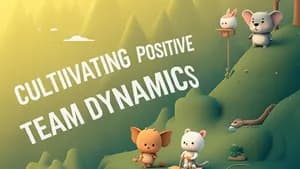Introduction: The Power of Positive Relationships
Building strong relationships based on trust and respect is crucial for success in all aspects of life, especially in collaborative learning environments. Whether you're working on a group project, participating in a study group, or simply interacting with classmates and teachers, positive relationships foster a supportive and productive atmosphere. This article provides practical strategies to cultivate trust, empathy, and mutual respect within your team, leading to enhanced learning outcomes and a more enjoyable educational experience. Think about the best group projects you've ever been involved in – they likely involved a strong sense of camaraderie and shared purpose. This wasn't accidental; it was built through deliberate actions focused on respect, trust, and effective communication. This guide will give you the tools to cultivate these same positive dynamics in your learning endeavors.
Open Communication: The Foundation of Trust
Open communication is the bedrock of any strong relationship. It involves expressing your thoughts and feelings honestly and respectfully, while also actively listening to and understanding the perspectives of others. In a study group, for example, ensure everyone has a chance to speak, and avoid interrupting. If you disagree with someone, express your disagreement in a respectful way; focus on the issue, not the person. One way to practice this is to use “I” statements. Instead of saying “You’re always late,” try, “I feel frustrated when our meetings start late because it impacts our productivity.” This shifts the focus from blame to shared problem-solving. Remember, effective communication is not just about speaking; it's about actively listening and understanding. In one particular class I remember, students had to give presentations. I noticed a few students who struggled to articulate their ideas clearly due to shyness. I encouraged them to practice with me outside class and provided guidance on organizing their presentations. This approach built trust, fostered open communication, and eventually enhanced their academic performance. Open dialogue, free from fear of judgment, makes a world of difference. Try to create an environment where everyone feels safe to share ideas, even if they are unconventional or seem risky.
Active Listening: Understanding Perspectives
Active listening goes beyond simply hearing what others say; it involves fully concentrating on the speaker, understanding their message, responding thoughtfully, and remembering what was said. This is crucial in building trust and empathy. When someone is speaking, put away your phone, make eye contact, and show that you are engaged. Ask clarifying questions to ensure you understand their point of view. Paraphrase what they've said to confirm your understanding. For example, if a classmate says, "I'm struggling with this concept," don't just say, "Oh, yeah, me too." Instead, ask, "What specifically is causing you difficulty? Can we go over it together?" By actively listening, you show that you value their thoughts and concerns, and that you're willing to support them. In my experience, creating opportunities for peer teaching has been incredibly effective. Students who feel confident in a subject can support those who are struggling, thereby actively listening and providing personalized support. This mutually benefits everyone.
Empathy and Mutual Respect: Valuing Individual Contributions
Empathy is the ability to understand and share the feelings of others. In a team setting, it means acknowledging and respecting individual differences, strengths, and limitations. Everyone has different learning styles and experiences. Acknowledge and celebrate these differences, rather than allowing them to create division. Remember that everyone has something valuable to contribute. For example, if one member is better at research, appreciate their efforts and don’t undervalue their contribution simply because another member is better at presentation. You might find a quiet student excels at problem-solving while another excels at creative brainstorming. Encourage and support each other's strengths, and offer assistance with areas where you excel. This approach builds mutual respect and appreciation, leading to a more collaborative and inclusive learning environment. I recall a student who was exceptionally talented in art but struggled with mathematics. By recognizing his artistic strengths and providing additional support in mathematics, he developed confidence and a sense of self-worth. This holistic approach emphasized the importance of mutual respect and individual strengths.
Appreciation and Encouragement: Fostering Positive Reinforcement
Expressing sincere appreciation and offering regular encouragement are vital components in building strong relationships. Acknowledge the efforts and contributions of each team member. A simple "thank you" or a specific compliment about a well-executed task goes a long way in building morale and motivation. Remember to focus on effort and improvement, not just results. For instance, if a teammate struggles with a particular aspect of a project, commend their persistence and determination. This approach fosters a positive and supportive atmosphere, encouraging everyone to give their best. I've always believed in the power of positive reinforcement. In one particular classroom, I introduced a 'success board' where students could share their accomplishments, both academic and personal. This created a culture of appreciation and mutual encouragement, boosting everyone's confidence. Regular, genuine positive feedback can transform the learning experience. Try to make it a habit to acknowledge both individual and collective achievements.
Conclusion: Cultivating a Culture of Collaboration
Building strong relationships based on trust, empathy, and mutual respect is an ongoing process that requires consistent effort and commitment. By implementing the strategies discussed in this article – open communication, active listening, empathy, appreciation, and encouragement – you can create a supportive and collaborative learning environment. This will lead to improved academic performance, enhanced personal growth, and a more positive and enjoyable educational experience. Remember, strong relationships are not simply built; they are nurtured and cultivated over time through consistent and conscious effort. Invest in these relationships, and you will reap significant benefits, both academically and personally. The skills you develop in building strong teams are transferable to all aspects of life and are incredibly valuable in the long run. Focus on building these strong bonds, and you'll find that the learning process becomes more rewarding, more enjoyable, and ultimately, more successful.

